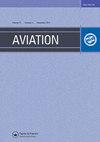在仪器程序训练的模拟会议中使用的学习工具平台的比较
IF 1.3
Q3 ENGINEERING, AEROSPACE
引用次数: 0
摘要
作者旨在分析空中交通飞行员执照理论中使用仿真技术的要求,并基于所选、测量和解释的参数,对捷克空军使用的平台进行比较。在国防大学,仿真中心被用作辅助工具。本文的目的是在运用基本的无线电导航理论时,为学生飞行员确定最合适的飞行平台。为了验证这一分析,进行了模拟学生飞行。第一组进近在Zlin - Z142飞机的模拟平台上进行,第二组进近在L39 - Albatros飞机上进行。对个别航班进行统计评估和比较。比较的参数是飞行高度相对于建议进近高度的偏差和航向相对于最终进近航向的偏差。通过f检验对已完成的模拟飞行进行了统计评价,验证了低速飞行的Zlin Z-142更适合于《无线电导航》理论课的教学。根据结果,Z142平台给学生更多的时间来观察引航错误,并在开始最后的进近阶段之前纠正它。本文章由计算机程序翻译,如有差异,请以英文原文为准。
COMPARISON OF PLATFORMS USED IN SIMULATED SESSION AS A LEARNING TOOL FOR INSTRUMENT PROCEDURES TRAINING
Authors aim to analyze the requirements for the use of simulation technologies for the Air Traffic Pilot License Theory and, based on the selected, measured, and interpreted parameters, to compare the platforms used by the Czech Air Force. At the University of Defence, the simulation center is used as a support instrument. The objective of this paper is to determine the most appropriate flying platform for student-pilots when employing basic radionavigation theory. To verify the analysis, simulated student flights were carried out. The first group of approaches was performed on the simulated platform of the Zlin Z142 aircraft, and the second group on the L39 Albatros aircraft. Individual flights were statistically evaluated and compared. The parameters for comparison were the deviation of the flight altitude compared to the recommended approach altitude and the deviation of the heading compared to the final approach course. Statistical evaluation of the performed simulated flights was made by F-test and verified confirmed that to teach the theoretical subject of Radionavigation, a slower-flying Zlin Z-142 is more suitable. According to the results, the Z142 platform gives the student more time to observe a pilotage error and correct it before starting the final approach phase.
求助全文
通过发布文献求助,成功后即可免费获取论文全文。
去求助
来源期刊

Aviation
ENGINEERING, AEROSPACE-
CiteScore
2.40
自引率
10.00%
发文量
20
审稿时长
15 weeks
期刊介绍:
CONCERNING THE FOLLOWING FIELDS OF RESEARCH: ▪ Flight Physics ▪ Air Traffic Management ▪ Aerostructures ▪ Airports ▪ Propulsion ▪ Human Factors ▪ Aircraft Avionics, Systems and Equipment ▪ Air Transport Technologies and Development ▪ Flight Mechanics ▪ History of Aviation ▪ Integrated Design and Validation (method and tools) Besides, it publishes: short reports and notes, reviews, reports about conferences and workshops
 求助内容:
求助内容: 应助结果提醒方式:
应助结果提醒方式:


